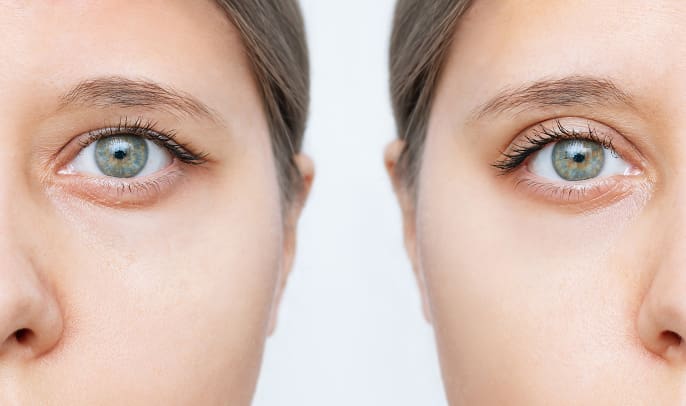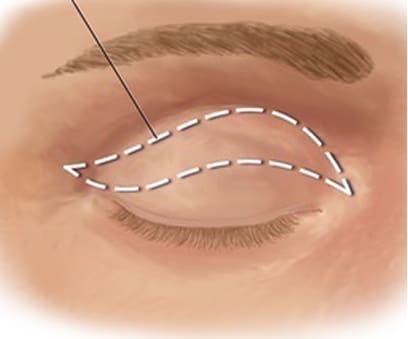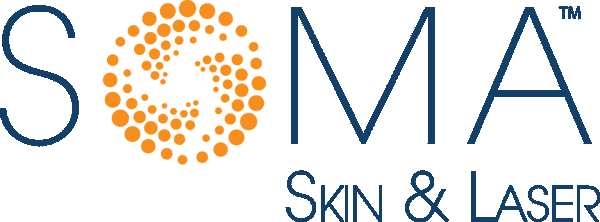If you’re considering eyelid surgery to improve the appearance of your upper eyelids, we invite you to schedule a consultation for laser-assisted upper blepharoplasty in New Jersey.
Upper blepharoplasty, also known as an eyelid lift, is a safe and effective surgical procedure that can enhance the appearance of your eyes, restore a more youthful look, and improve your vision.
During your consultation, our surgeon will evaluate your medical history, examine your eyes, and discuss your goals and expectations for the surgery. They will also provide you with detailed information on the procedure, the recovery process, and any potential risks or complications. So, take the first step towards achieving the look you desire and call us to schedule your consultation today.
Book Appointment
Before After

What is upper blepharoplasty?
Upper blepharoplasty, also known as upper eyelid surgery, is a cosmetic surgical procedure designed to improve the appearance of the upper eyelids. This procedure involves the removal of excess skin, fat, and muscle from the upper eyelids, resulting in a more youthful and rejuvenated appearance.
The surgery is typically performed under local anesthesia, and the recovery time is relatively quick. Upper blepharoplasty can be an excellent option for individuals who have sagging or drooping eyelids, which can make them look tired or older than they actually are.
How is laser used for blepharoplasty?
CO2 laser is a type of surgical laser that uses carbon dioxide gas to generate a beam of light that can be used to cut and remove tissue. In blepharoplasty, CO2 laser is often used to make incisions in the skin of the upper eyelids. Unlike traditional surgical methods, the CO2 laser provides precise and controlled cuts, minimizing the risk of bleeding and scarring. The laser also has the added benefit of sealing blood vessels and nerves as it cuts, resulting in less swelling and discomfort during the recovery process. Overall, CO2 laser is a safe and effective technique for upper blepharoplasty that can provide excellent results with minimal risk of complications.
Am I awake for upper blepharoplasty?
Upper blepharoplasty is typically performed under local anesthesia, which means that you will be awake during the procedure but will not feel any pain or discomfort. The surgeon will administer a local anesthetic to numb the area around the eyes, which is accomplished with injections. You will be able to communicate with the surgeon throughout the procedure, and you may feel some tugging or pressure as the excess skin and fat are removed. Most patients find that they are comfortable and relaxed during the procedure, and some even choose to listen to music or an audiobook. Since upper blepharoplasty is performed under local anesthesia, there is no need for general anesthesia, which can carry more risks and a longer recovery time. Overall, being awake during upper blepharoplasty is a safe and effective option for patients seeking to improve the appearance of their upper eyelids.
In some cases, the surgeon may also prescribe Valium, a type of medication that can help you feel more relaxed and comfortable during the procedure. Valium is a mild sedative that can be taken orally before the surgery, and it can help reduce anxiety and calm your nerves. However, if you choose to take Valium, it is important to have a friend or family member drive you to and from the surgery, as the medication can cause drowsiness and impair your ability to drive safely. Your surgeon will discuss the use of Valium and other medications with you before the surgery and provide detailed instructions on how and when to take them. It is essential to follow these instructions carefully to ensure a safe and successful surgery.
Can I drive myself home after upper blepharoplasty?
It is not recommended to drive yourself home after an upper blepharoplasty procedure. The surgery involves local anesthesia and may require the use of sedatives or pain medications, which can affect your ability to drive safely. Additionally, your vision may be temporarily impaired due to swelling, bruising, or eye drops used during the surgery, which can make it challenging to operate a vehicle. It is best to arrange for someone to drive you home after the surgery or take public transportation or a taxi. It is also recommended to have someone stay with you for the first 24 hours after the surgery to ensure that you are comfortable and to monitor your recovery. Your surgeon will provide you with detailed instructions on how to prepare for the surgery and what to expect during the recovery period, including guidelines on when it is safe to resume driving.
What are the risks of upper blepharoplasty?
Like any surgical procedure, upper blepharoplasty carries some risks, although complications are relatively uncommon. Some potential risks include bleeding, infection, scarring, asymmetry, and temporary or permanent changes in vision. Before the procedure, your surgeon will evaluate your medical history and perform a physical exam to determine whether you are a suitable candidate for the surgery. They will also provide you with detailed instructions on how to prepare for the surgery and what to expect during the recovery period. Following these instructions carefully can help reduce the risk of complications and promote a successful outcome. While the risks of upper blepharoplasty are relatively low, it is essential to be aware of them and discuss any concerns with your surgeon before the surgery.
How should I prepare for upper blepharoplasty surgery?
It is crucial to avoid any medication that can increase the risk of bleeding before undergoing an upper blepharoplasty surgery. These medications include blood thinners, Vitamin E, fish oils and aspirin. It is important to discuss any medications you are currently taking with your surgeon and follow their instructions regarding stopping or adjusting them. Failure to do so can increase the risk of bleeding during the surgery and prolong the healing process. Therefore, it is essential to take this precaution seriously to minimize the risk of complications and ensure a safe and successful surgery.
Your surgeon will provide you with detailed instructions on how to prepare for the surgery, including any medications or supplements to avoid before the procedure. You may also need to have blood tests or other medical evaluations to ensure that you are healthy enough for surgery. It is important to stop smoking and avoid alcohol for at least two weeks before the surgery, as these substances can interfere with the healing process. Additionally, you should arrange for someone to drive you to and from the surgery and to stay with you for the first 24 hours after the procedure. It is also recommended to prepare a comfortable recovery area with plenty of pillows, ice packs, and over-the-counter pain medications. Following these preparations can help ensure a safe and successful upper blepharoplasty surgery and a smooth recovery period.
